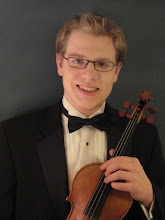I was recently watching an interview with modern composer Arvo Part (which can be found here: http://www.youtube.com/watch?v=2pDjT1UNT3s) which really struck me with some new ideas. Lately I've been listening to a lot of very dense, complex music such as Beethoven and Brahms, filled with extreme counterpoint and thick harmonizations. I love this music! The activity that it creates is phenomenal and, in my opinion, shows how brilliant composers like them are. I have been realizing more and more, though, that there is an opposite, yet equally astonishing kind of music, that shows the simpler side of tonality. Composers such as Arvo Part believe that the purity of a single tone is enough to create beautiful music. While Brahms can sometimes have an extraordinary number of lines going at the same time, such as a bass, a moving underlying line, and melody, a countermelody, a harmony, etc. etc.; the majority of Arvo Part's music only ever has 2 lines at once. In his own words, he says that he likes to think of one line representing sins, and the other representing forgiveness; one line being more busy and moving, the other very simple and still. This kind of music does not force brain activity like a Beethoven symphony or a Brahms sextet does, but it produces emotions just as easily, and some might even argue more-so (though that might be going too far).
Arvo Part isn't the only one who composes in such a manner. Many of the modern minimalist composers have the idea that a simple line of tones, or row of basic repeated chords can create just as much emotional impact as a complicated counterpoint can. Philip Glass uses gradually changing chord progressions to create his music. These progressions are often repeated multiple times (calm down music theorists, it really is okay!) until they are only slightly changed to eventually progress the music. (His set of Metamorphoses is a very good example of this. My personal favorite is Metamorphosis 2:http://www.youtube.com/watch?v=CcyTyLqkvoU).
I do find the difference between complicated and simplicity very interesting in music. It's fun to explore the difference in playing, listening, and even writing in both styles and also trying to find in-between areas that work well. I encourage anyone who might have any interest in doing the same to...well...do the same! :)
Phil
Tuesday, September 14, 2010
Subscribe to:
Comments (Atom)



